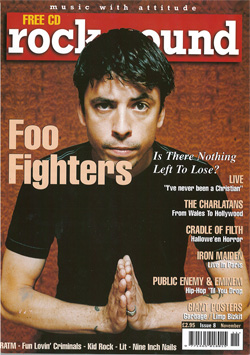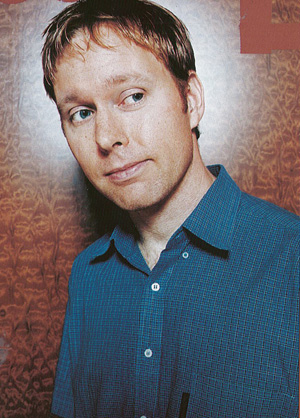Words: Darren Taylor Pics: Phillipe Mazzoni
rs:You're back with a new album, how's everything been going?
D: It's been busy, because we had a year away from the public so we've forgotten how to work. We haven't been doing interviews, radio or TV. We've been completely out of the spotlight lately, in the studio at my house in Virginia, and only focused on making the record. And we didn't have a record company for almost about a year so we didn't have anyone telling us what to do.
rs:Is it really difficult getting back in the public eye while launching a new record?
D: We love talking about ourselves (laughs). I think it's interesting to see other people's perspective and it's always fun to go to Japan and discuss lyrics with the Japanese because they have their own take on every lyric. They take things totally out of perspective and it's interesting. You know, there are things that are lost in translation, then there are things that are added in another translation that can be really interesting. But, as far as going out and doing press and promoting your band it's pretty secondary to the big picture.
FUCK 'EM ALL
rs: The title of the album, 'There Is Nothing To Left To Lose', sounds like it has a degree of optimism in the face of adversity. Would you agree?
D: Well it can be both optimistic and desperate.
T: Sorry, but the way I see it is like a new beginning 'cos everything, all the ideas and everything has been kinda stripped away?
rs: Is there also a kind of 'Fuck them all' attitude to it?
T: Yeah definitely!
D: That's where it came into my mind. A friend and I were talking and this friend had gone through a year and a half of turmoil and shit and got to this point of, "Fuck it I'm just going to forget about everything. I've been as low as I could possibly go and now there really is nothing left to lose and there's nowhere to go but up". So it is like a new beginning.
rs: I presume it's no accident that the first single is called 'Learn To Fly'?
D: 'Learn To Fly' is about the search for inspiration that makes you feel alive. So yeah, I guess there's kind of a correlation.
That sheds more of a positive light on the title of the album and its meaning.
rs: Has your relationship with each other been strengthened during the recording of the new album?
D: We lived with each other while we were making the record. We haven't been away from each other for more than two weeks at a time. We're closer now than we've ever been 'cos we haven't had any distance between us at all.
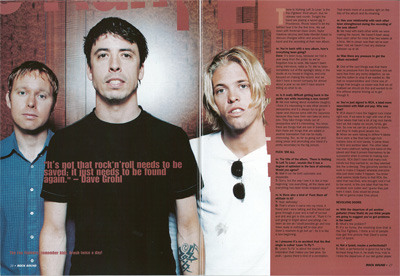 rs: Was there any pressure to get the album recorded?
rs: Was there any pressure to get the album recorded?
D: One of the cool things was that there was no pressure from the business 'cos we were free from any sorta obligation, so we had the option to stop if we wanted to. We had no responsibilites and I think one of things that brought us closer was that we all realised we should do this and wanted to do this without anyone forcing us to get through it.
rs: You've just signed to RCA, a label more associated with R&B and pop. Why was that?
T: RCA doesn't have the biggest rock roster right now. If we were to sign with one of the other labels that had a lot of big rock bands then we felt maybe we would, kinda, get lost. So now we can be a priority to them, and they're really good people too.
D: When we were talking to different labels there were a few that had huge rock rosters; tons of rock bands. It came down to RCA and another label. The other label had every platinum selling rock band on the planet and they'd proven themselves to be successful when it comes to making rock records. RCA didn't have that many rock bands but they wanted to, so they seemed like the underdog. They genuinely wanted to work to make it happen whereas everyone else just does make it happen. You know what seems kinda funny is that RCA, the label that had Elvis, who brought rock'n'roll to the world, is the one label that has the smallest rock roster and I guess they just want it back. Elvis would be proud.
T: We're gonna make Elvis proud.
REVOLVING DOORS
rs: With the departure of yet another guitarist (Franz Stahl) do you think people are going to suggest you've got problems in the band?
D: What's the problem?
T: It's so funny, the revolving door that is the Foo Fighters. I think a lot of people may get this picture that Dave's some sort of tyrant.
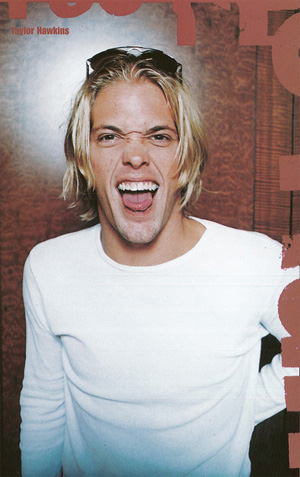 rs: Not a tyrant, maybe a perfectionist?
rs: Not a tyrant, maybe a perfectionist?
T: Well, a perfectionist is good but he's the farthest thing from it, he really truly, truly is. I think the departure of our last guitar player
had just as much to do with himself. It wasn't like Dave is: "Alright, this how we're gonna do this album, we're gonna get rid of this guy and..." you know. Nate made a good point once about how our band has gone through what most bands go through before they release their first record. We've just gone through that in public. The foundation of the band was weird enough, it was just a demo tape and then it turned into a band.
rs: You've replaced Franz with Chris Shiflett from No Use For A Name. Why did you choose him?
D: He doesn't make mistakes. He seems really excited to do it. We've played with some people who've been in other bands and kinda been through the same thing. They always wanna know how big their hotel suite is gonna be.
T: It's better to have somebody who's like, "Wow, that's my bunk, no way! Can I open the mini-bar, are we allowed to?"
D: We flew over here yesterday on business class and Chris was like, "Wow!" When he gets on stage he's just got this smile: "There's people here, that's great." He's got a good energy, aura and vibe.
rs: So how does it work during the recording: is Dave in charge?
D: Yes!
T: You have to have someone who has the main vision. If me and Nate challenged every one of Dave's ideas then it would take us three years to make a record. I think that Nate, especially, and me come up with little things to help change the songs here and there, but you gotta have some sorta of leadership and Dave writes the songs.
D: Also you have to faith in everyone else too. You have to be comfortable to give up the reins and hand them to someone else. There's a song on the record called 'Aurora', that just kinda happened and that was the greatest feeling. That was the first thing we wrote for the record and it was great. Nate: That one happened without even
talking to each other.
D: We didn't say anything and it turned out to be probably the best song on the record.
T: I think we almost played it the first night how it is now except for a few changes within the sequences but there's this end part that just wrote itself.
D: Usually when we'll do something we have a basic idea and we sort of hatch out the arrangement and hone it down and condense it into something that makes sense. With this album we were more
concerned with arrangement than ever 'cos there were so many riffs and melodies and so many different ways to go with everything that it was like finding the combination to a lock. Taylor would put down his drum track, I'd put down my guitar, Nate would come in and do a bass. We would all step in and do our thing and then back off. When Nate does his bass everyone just...
T: Disappears.
D: It's amazing 'cos you're listening to
something that just has drums and guitars and the arrangement's good and then when you come back again Nate's put a bass on it and the songs gotten to be this big and you're like 'Oh Wow!'
T: The really interesting thing about the way the album was done is that you're sitting there and you're laying these tracks, Dave waits till the end to do the lyrics and the melodies. It's just this skeleton of a song and then me and Nate leave the studio and Dave goes in and starts putting all the
melodies and lyrics together. With 'Aurora' I had no idea where that song was going.
MELODY MAKERS
rs: You've gone for a less polished production this time. Was that a deliberate decision?
D: Well, there are some songs that are fast that have a punk/pop feel, there are some songs that sound kinda '70s, there are some songs that are six minutes long that go into these weird crescendos. We had a song that sounded like Lynyrd Skynrcl, you know southern rock. But you're right the first
record had a nice feel to it 'cos it's just so raw, it was just immediately there. There wasn't any production at all, there weren't more than three guitars on anything 'cos it had to be done in a week. The second record was totally produced and tuned. So we decided it would be fun to build a studio and just do it on our own this time around. We learned a lot from the last record; about recording it, and the pre-production —arranging the songs that there's no reason we couldn't have done it ourselves. Adam Kasper, the producer we worked with, helped us get these sounds that sound as real and big as they would in the room you're playing.
T: Warts and all.
D: I'd hate to belittle his position 'cos I think Adam is a great producer and he lets you do what you want to do but he still keeps you in the right place. Whereas someone like Steve Albini will just let you fuckin' do whatever the hell you wanna do. It doesn't matter if it's in tune or whatever.
T: I think he was hardest on your vocals.
D: Oh yeah! One of the things that disturbs me about a lot of music today is that it's too produced. Bands today are so concerned with production that it takes away from the music. Record companies and the business side pollute the creativity and individuality of each artist and that's a problem 'cos you turn on the radio and all the fuckin' drums sound the same. All the distorted guitars sound the same because no one wants to take the risk of having a guitar that's really fucked up because the radio stations will never play it. So it was important that we would go in and make something that had nothing to do with computers. We just brought some old equipment and recorded it in the basement. And it sounds fuckin' good.
ROCK'N'ROLL SAVIOURS?
rs: Do you feel that rock has come back this year, like everyone promised?
D: It hasn't gone anywhere.
N: People are talking about the return of rock 'n' roll now. I thought it was dead.
T: That's so funny 'cos last time we started to go out and do press for the record, it was "Rock 'n' roll is dead", I swear to God. We were like "Oh wow! We feel like this weird anomaly; what are we doing? Trying to re-live our high school years?"
D: If one more person comes out and says "We here to save rock 'n' roll" I'm going to kill them.
N: I think Billy Corgan, Marilyn Manson and Hole saved it for us.
D: We released 'Colour And The Shape' in '97, that's when Chemical Brothers, Prodigy and Underworld were becoming popular so everyone thought, "Wow, rock 'n' roll must be dying, people are using computers." I remember saying "You'll always look 10 times cooler holding a guitar than you will standing in front of a fuckin' computer screen making music." But, anyway, all of the rock bands were coming out one-by-one, once every three months, a new release by a popular rock person; "I'm here to save rock 'n' roll. All of this shit that's goin' on is bullshit. Nobody knows how to fuckin' rock. It's not exciting anymore. People need a rockstar!" Then the next one comes along, "Everyone's full of shit, rock 'n' roll needs to be saved and I'm here to do it because I am that charismatic superhero that you need to look up to." No one's fuckin' concerned with their music, they're concerned with the rock persona, the myth of the rock star. That's 'cos they think they're going to save rock 'n' roll, by wearing make-up and being a celebrity. All those fuckin' albums that came out that were supposed to save rock 'n' roll were more concerned with their image than the fuckin' music. Everyone made shitty records and that's why rock 'n' roll took a shit because everyone was makin' fucked up records that sucked. It was a really disgusting time, it was an awful period. I have nothing to say; I just wanna make music.
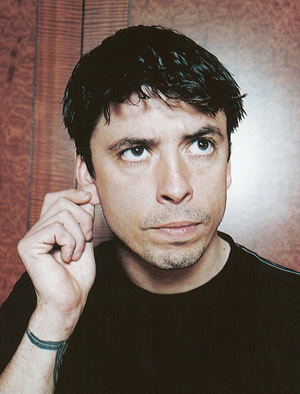 T: They were tying to emulate Fleetwood Mac and David Bowie and all that kinda stuff...
T: They were tying to emulate Fleetwood Mac and David Bowie and all that kinda stuff...
D: They're trying to relive rock 'n' roll from the '70s. Everyone believes so much in the legend of rock 'n' roll that they forget about makin' fuckin' music. Instead of writing they're just trying to play out some rock 'n' roll play in their head. As if that's gonna work. It's not that rock 'n' roll needs to be saved; it just needs to be found again.
T: And we're here to find it...
D: No we're not.
T: I was kidding.
rs: Is there some sort of plan or something you want to achieve with this new album?
D: No, there's no hidden agenda.
T: This is the first album that I've been involved with so I can judge it more from an outside point of view — the first two albums to this album. I think this album sets us up to explore further, musically, with different shapes and textures, which is good and exactly what we wanted to do.
D: I always felt like we were a band that imagined melodies, imagined ballads and imagined sweet songs but had a hard time removing ourselves from being a punk rock band. So whenever we tried to do something sweet and beautiful it sometimes sounded forced and that's not really what we were. For the first three or four years of the band we were just a fuckin' hardcore band singing these songs that we'd written 'cos we'd imagined it but we didn't know exactly how to execute them. Being in Virginia made things more comfortable, it's where I grew up, I was in my own house. I recorded all the guitar parts and sang all the vocals while I was sitting on my couch so you couldn't feel any more comfortable than that. It was the most relaxed recording environment you could ask for. Having the freedom of your own studio and no time constraint whatsoever and a producer who's letting you do whatever you really wanna do, and it's in your own house, I think that influenced me a lot. Thinking of the last album where we were in Hollywood, surrounded by the industry, working on a crazy deadline, working crazy hours trying to get 'things exactly perfect might have stolen some of the beauty out of each song.
Make no mistake. 'There's Nothing Left To Lose' means there's everything to gain. Take a listen to the Foo Fighters and find out why.

